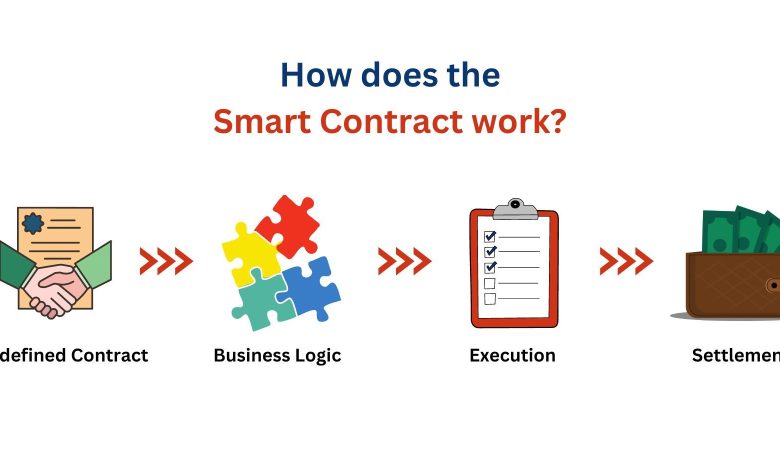Understanding Smart Contracts: Automation on the Blockchain

- What are smart contracts and how do they work?
- The benefits of using smart contracts in blockchain technology
- Examples of industries that can benefit from smart contracts
- Challenges and limitations of smart contracts
- How smart contracts are revolutionizing the way we do business
- The future of smart contracts in the blockchain ecosystem
What are smart contracts and how do they work?
Smart contracts are self-executing contracts with the terms of the agreement directly written into code. These contracts run on the blockchain, a decentralized and distributed ledger technology that ensures transparency and security. Smart contracts work by automatically enforcing the terms of the agreement when predefined conditions are met. This automation eliminates the need for intermediaries, reducing costs and increasing efficiency.
The benefits of using smart contracts in blockchain technology
Smart contracts offer numerous advantages when utilized in blockchain technology. These automated contracts help streamline processes, reduce the need for intermediaries, and enhance security. By leveraging smart contracts, parties can execute agreements without the need for a trusted third party, thereby reducing costs and increasing efficiency.
One of the key benefits of smart contracts is their ability to enforce agreements automatically. Once the conditions of the contract are met, the contract self-executes, eliminating the potential for human error or manipulation. This feature not only saves time but also ensures that all parties involved adhere to the terms of the agreement.
Moreover, smart contracts are immutable, meaning that once deployed on the blockchain, they cannot be altered or tampered with. This provides a high level of security and trust in the agreement, as the terms are transparent and cannot be changed without the consensus of all parties. This feature is particularly valuable in industries where data integrity and security are paramount.
Additionally, smart contracts can help reduce the risk of fraud by automating the verification process. Since the terms of the contract are encoded in the blockchain, there is no room for misinterpretation or manipulation. This not only increases trust between parties but also minimizes the potential for disputes or legal issues.
In conclusion, the benefits of using smart contracts in blockchain technology are vast. From increased efficiency and cost savings to enhanced security and trust, smart contracts offer a revolutionary way to conduct business and execute agreements. As blockchain technology continues to evolve, smart contracts will play an increasingly important role in automating processes and revolutionizing industries.
Examples of industries that can benefit from smart contracts
Various industries can benefit from the implementation of smart contracts on the blockchain technology. These contracts can streamline processes, reduce costs, and increase efficiency. Some examples of industries that can leverage smart contracts include:
- Real Estate: Smart contracts can automate property transactions, ensuring secure and transparent deals between buyers and sellers.
- Supply Chain Management: By using smart contracts, companies can track the movement of goods, verify authenticity, and automate payments.
- Insurance: Smart contracts can simplify claims processing, reduce fraud, and improve the overall customer experience in the insurance industry.
- Healthcare: Healthcare providers can use smart contracts to securely store patient data, streamline billing processes, and ensure compliance with regulations.
- Legal: Smart contracts can automate legal agreements, enforce terms and conditions, and provide a secure platform for dispute resolution.
Overall, smart contracts have the potential to revolutionize various industries by introducing automation, transparency, and security to traditional processes. As more businesses adopt this technology, we can expect to see increased efficiency and innovation across different sectors.
Challenges and limitations of smart contracts
There are several challenges and limitations associated with smart contracts that users should be aware of when utilizing this technology on the blockchain. One of the main challenges is the potential for bugs or vulnerabilities in the code, which can lead to unexpected outcomes or security breaches. It is essential for developers to thoroughly test and audit their smart contracts to minimize these risks.
Another limitation of smart contracts is their inability to access external data sources, known as the “oracle problem.” This can restrict the functionality of smart contracts and limit their use cases. Developers are working on solutions to this issue, such as integrating oracles into smart contract platforms.
Additionally, the irreversible nature of smart contracts poses a challenge in cases where errors occur or disputes arise. Unlike traditional contracts, smart contracts cannot be easily modified or reversed once deployed on the blockchain. This lack of flexibility can be a drawback in certain situations.
Furthermore, the complexity of smart contract programming languages can be a barrier to adoption for those without a technical background. Understanding and writing smart contracts require a certain level of expertise, which can limit the accessibility of this technology to a wider audience.
In conclusion, while smart contracts offer numerous benefits in terms of automation and efficiency, they also come with challenges and limitations that need to be addressed. By being aware of these issues and actively working towards solutions, the potential of smart contracts on the blockchain can be fully realized.
How smart contracts are revolutionizing the way we do business
Smart contracts are transforming the way businesses operate by automating processes and reducing the need for intermediaries. These self-executing contracts are built on blockchain technology, ensuring transparency, security, and efficiency in transactions. By eliminating the need for manual intervention, smart contracts streamline operations and reduce the risk of errors or fraud.
One of the key advantages of smart contracts is their ability to execute transactions automatically once predefined conditions are met. This not only saves time but also reduces costs associated with traditional contract management. Additionally, smart contracts are immutable, meaning that once deployed on the blockchain, they cannot be altered, providing a high level of trust and security.
Furthermore, smart contracts have the potential to revolutionize various industries, including finance, real estate, supply chain management, and more. They can facilitate complex transactions, such as international trade or multi-party agreements, with ease and efficiency. As businesses continue to adopt blockchain technology, smart contracts are becoming an integral part of modern business operations.
The future of smart contracts in the blockchain ecosystem
The future of smart contracts in the blockchain ecosystem looks promising as more industries and businesses are recognizing the benefits of automation and security that smart contracts offer. These self-executing contracts are revolutionizing the way agreements are made and enforced, eliminating the need for intermediaries and reducing the risk of fraud.
Smart contracts have the potential to streamline processes, increase efficiency, and reduce costs across various sectors such as finance, real estate, supply chain management, and more. With the rise of decentralized finance (DeFi) and non-fungible tokens (NFTs), smart contracts are becoming increasingly popular and are expected to play a significant role in the future of the blockchain ecosystem.
As blockchain technology continues to evolve and mature, smart contracts will likely become more sophisticated and versatile, enabling complex agreements to be executed seamlessly and securely. Developers are constantly innovating and exploring new use cases for smart contracts, paving the way for a more automated and transparent future.
In conclusion, the future of smart contracts in the blockchain ecosystem is bright, with endless possibilities for automation and efficiency. As businesses and industries continue to adopt this technology, we can expect to see a more secure, transparent, and decentralized way of conducting transactions and agreements. Smart contracts are here to stay and will undoubtedly shape the future of the digital economy.



